25 years since Dean Smith’s retirement: The 24 hours that changed Carolina basketball
North Carolina’s legendary men’s basketball coach Dean Smith tasked his longtime administrative assistant Linda Woods to gather the coaching staff into his office.
It was time to let them know.
He’d already informed longtime assistant coach Bill Guthridge of his plan to retire and his succession plan that would move Guthridge to the head-coaching seat.
Guthridge sat in his normal seat to the left of Smith’s desk. Woods stayed in the meeting but was standing. Assistant coaches Dave Hanners and Phil Ford and program assistant Pat Sullivan plopped down on the couch, which suggested they thought it was an informal meeting.
Smith started off saying that he felt really disconnected from the team that returned mostly intact after reaching the 1997 Final Four. He felt bogged down from his other obligations as head coach like fundraising and speaking engagements. He’d long talked about the day he didn’t feel recharged when practice started would be the day he stepped away from coaching. And this would be that day.
“He didn’t come right out and blast us with it, he kind of hemmed a little bit about it and then got into it,” Hanners said. “He was so compassionate. With the staff, the thing that was really on his mind, and he kept saying is, ‘Nothing’s going to change.’ ”
On the contrary. They knew that nothing would ever be the same.
Sunday marks the 25th anniversary of Smith, the patriarch of Carolina basketball, unexpectedly announcing his retirement on Oct. 9, 1997.
The day before his public announcement, Smith told those within the program. He tried to be reassuring when he informed them that Guthridge would become head coach, Hanners and Ford would remain in their positions and Sullivan would become a full-time assistant coach.
Smith anticipated Ford, who as a player at UNC was the epitome of what Smith wanted in a point guard, would be especially emotional and tried to bring levity to the situation.
“Even though you aren’t losing a friend, it felt like Carolina was losing something,” Ford said. “It felt like a loss to me. It wasn’t, but that’s kind of what it felt like. That we were losing coach so I started crying a little bit. He looked at me and said, ‘I knew you were going to cry.’ ”
Sullivan was probably the most shocked of them all. He was just two years removed from undergrad having served as a high school coach for one year before becoming a program assistant. He wasn’t that much older than the players he’d now be coaching and had actually been on the same roster as senior guard Shammond Williams. Sullivan carried with him a youthful naivete that Smith was immortal.
“If you played for him, you just thought him and coach Guthridge were going to coach forever, be around forever and live forever,” Sullivan said.
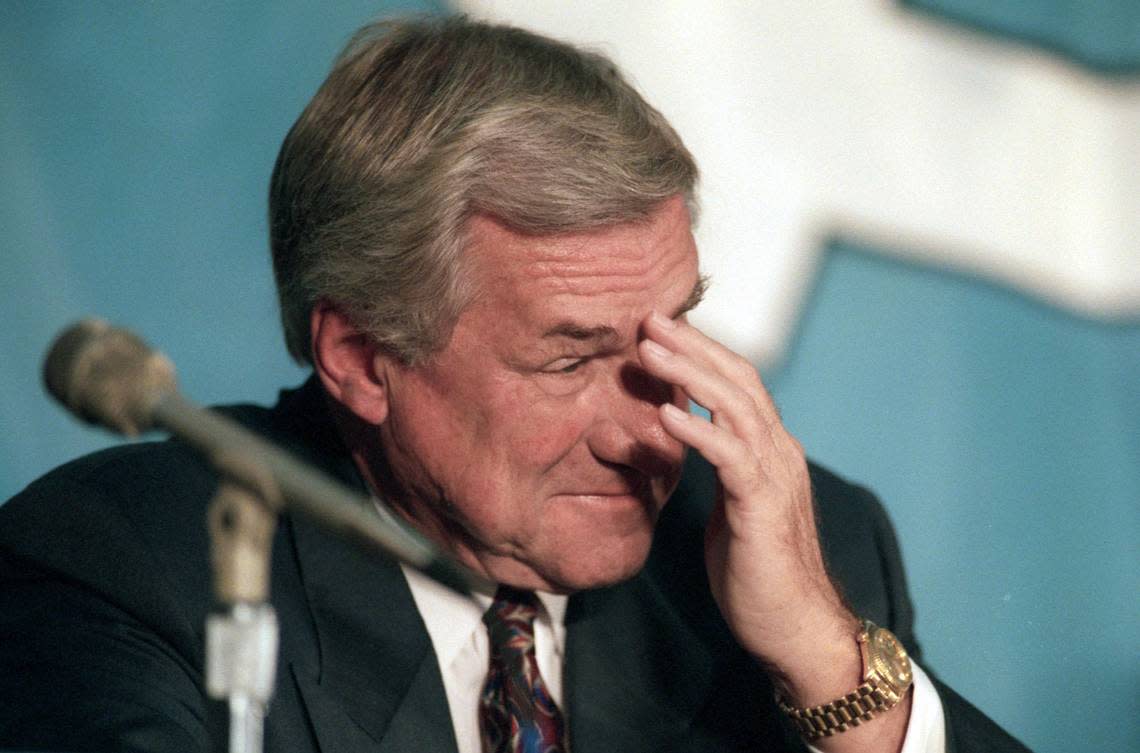
The signs were there
There were subtle hints during that offseason that Smith was planning on stepping down. Hanners was the early morning coach. When players had to run for disciplinary reasons at 7 a.m., he was the one responsible. Guthridge had asked to join him in the early morning for about a month to go over plays and sets he tracked during the season.
“Did I think it was odd? Not really,” Hanners said. “But looking back after it all happened, I really think he (Guthridge) had a feeling this time it was going to stick.”
For Brad Frederick, who is currently an assistant coach on Hubert Davis’ staff, but was then a junior forward on the team, it was Smith’s presence at morning workouts. He usually left that to the assistant coaches, but in the fall of ‘97, he made a point to attend.
“He had never done individual workouts in the past, but I don’t think anybody really put two and two together,” Frederick said. “That was different in the fall and he later told us that was to see if he could kind of get his batteries recharged.”
He couldn’t. A week before he told the staff, he informed then-athletic director Dick Baddour that he was leaning toward retiring. Baddour was traveling with the UNC’s football team to play at TCU so Smith said he’d take the weekend before he made his final decision.
Baddour was just hired that summer after John Swofford left the position to become the ACC commissioner. Smith told Baddour then that he wanted Guthridge to be his replacement, a move that Baddour said he endorsed. But it still made for an anxious weekend.
“I was tied up in knots about the whole thing,” Baddour said. “It was just the change. It was the end of that era in a way and everything that he stood for and everything that he achieved. It wasn’t like who’s gonna be next?”
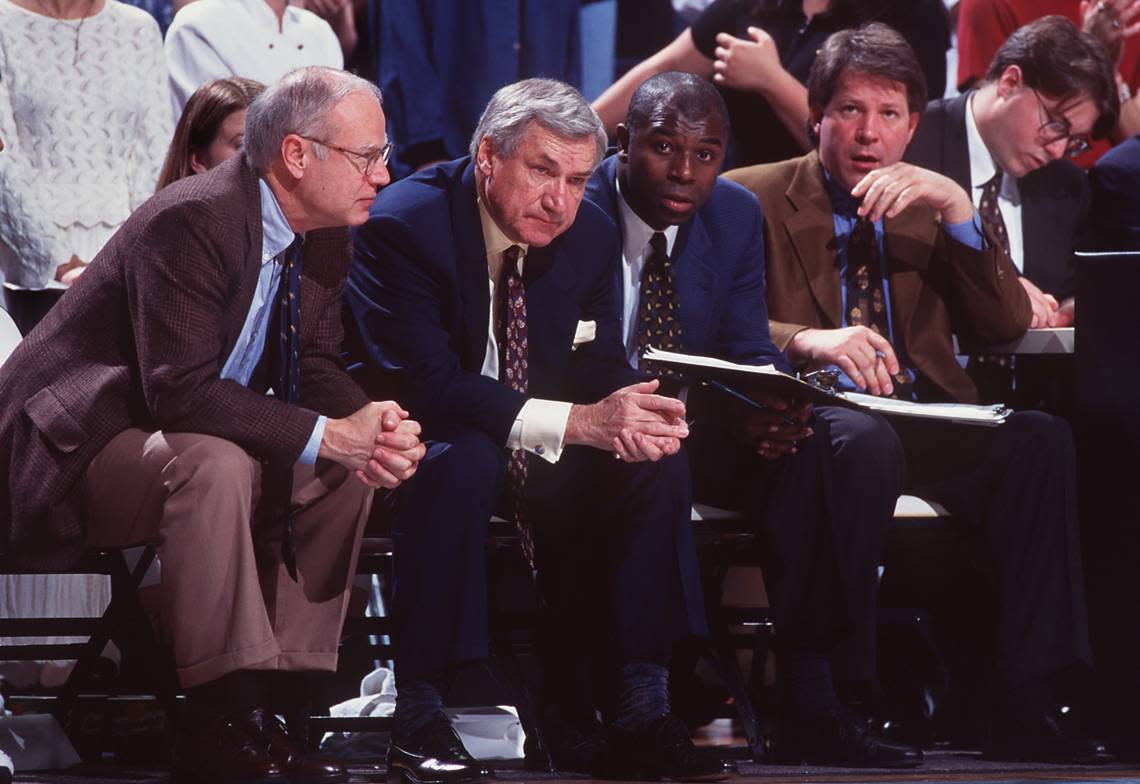
‘We thought the world was coming to an end’
There was nothing out of the ordinary on Oct. 8, 1997, that indicated to Carolina’s players that Smith was not planning to coach them. He took an extra step to ensure his announcement didn’t sabotage their workout that day.
Smith purposely sat with the Heels for their 1997-98 season team photo in part because he knew how hard many of them trained for the Carolina mile. Players had individual times to meet for their mile run, which included an easier goal and a “tough time” that was a bit faster pace, but those who cleared it earned some benefits.
After the run, Smith informed seniors Makhtar Ndiaye and Williams that he was calling a team meeting. That wasn’t cause for concern either. Team meetings were pretty standard, especially with practice starting in nine days.
But in the journey to the Smith Center, from Fetzer track, which is now just Anson Dorrance Field where the women’s and men’s soccer teams play, junior forward Antawn Jamison said he noticed Smith’s demeanor had changed when he entered the locker room.
The players, still in their team-issued gear, sat in chairs assembled for film study. But the sweat still drying on their cheeks quickly mixed with tears for some.
“Everything just started feeling different,” Jamison said. “He kind of had this sad tone, and he was talking about, ‘I always told myself whenever I hang it up it’s going to be right before the season.’ I can’t remember word for word, but he was just like, ‘Right now I don’t think I can be the coach you guys deserve.’ And we’re just looking around like hold up, say what now?”
Chris Stoen, who was one of two co-head managers with the team, thought Smith was going to say it was health-related.
“Admittedly, I was waiting for the, ‘But,’ or ‘I’m doing this because I’m not well’ or something,” Stoen said. “If memory serves, I think he even said, ‘I’m healthy. My family is good. I just don’t have it in me and you guys deserve better.’ ”
Williams internalized the whole process differently. He said during his recruitment Smith promised he’d coach him all four years, so Williams thought Smith was retiring at the end of the season. He even blurted out to the underclassmen, ‘I feel sorry for you guys.’
Until someone jarred him into reality, ‘No, he means he’s retiring now.’
The meeting didn’t last long. Smith told them Guthridge was going to be their new head coach, that Ford, Hanners and Sullivan would be the staff and repeated to them that things were going to remain the same.
Smith added that he wanted the news to remain confidential until the press conference before he exited the stunned and somber locker room.
“We thought the world was coming to an end because this man has taught us so much,” Jamison said.
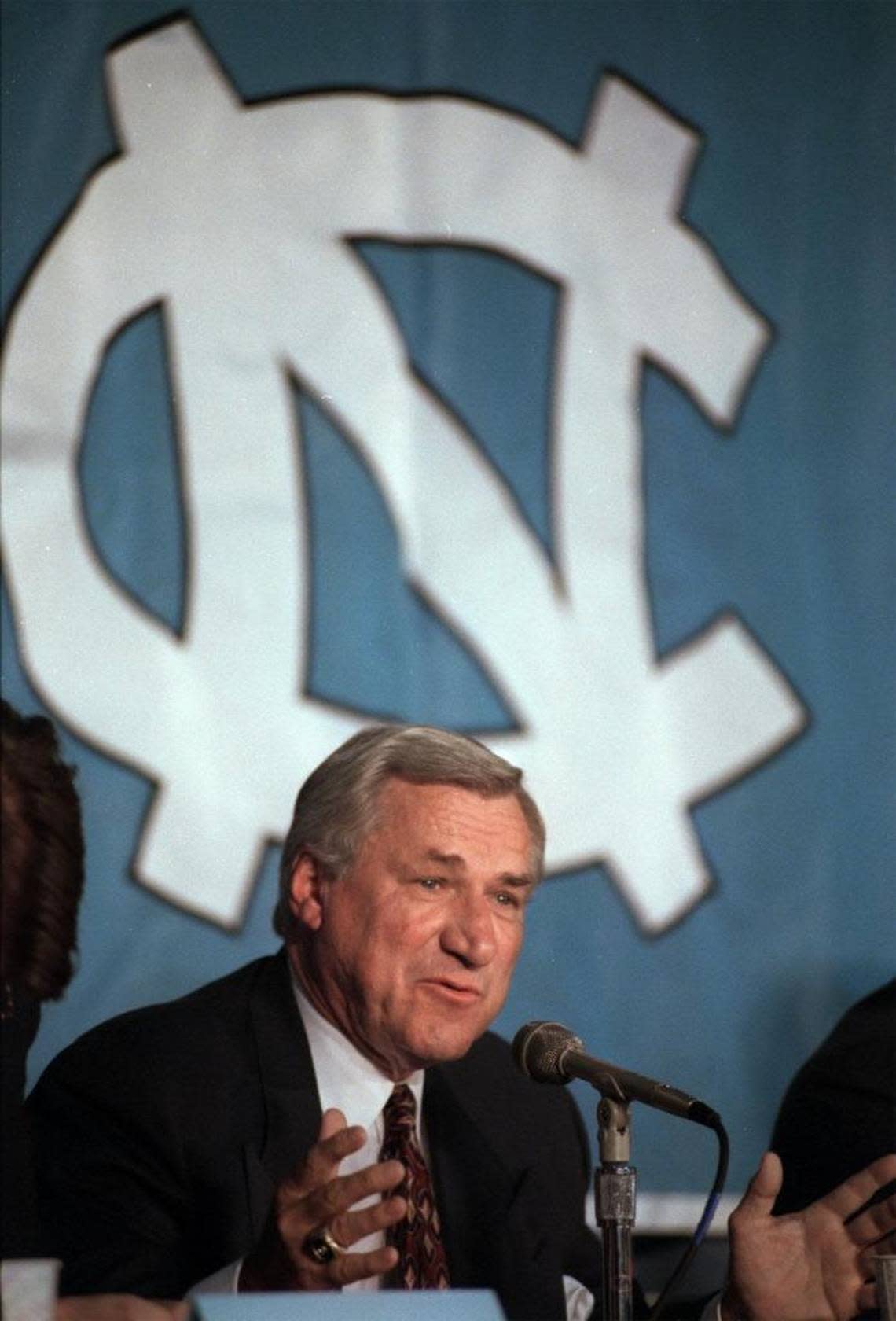
The perfect time to exit
The question the players wondered then, but understand more now, is why.
“The thing that always amazes me just as a coach, here you have a team with Vince Carter, Antawn Jamison, coming off the ‘97 Final Four and was clearly going to be a great team,” Frederick said. “You just think, OK, I would get it after ‘98. Most people would want to coach that team and that’d be a tough team to walk away from.”
Jamison said they all thought they’d get back to the Final Four and win it in ‘98.
“You have no idea how focused we were that offseason after losing to Arizona in the Final Four,” Jamison said. “Everybody stayed in at Chapel Hill for both sessions of summer school, it was just a commitment. We were determined to get back and do this thing one more time for Coach Smith.”
But that was why Williams realized later that it was the perfect time to exit. It all but guaranteed Guthridge would be successful that first season.
“If this was done in the spring, the team probably wouldn’t look the same way,” Williams said. “So I think Coach Smith was strategic because he always looked out for people. Bill would have a good transfer of power in leadership and have the type of team that could get him started up the right way.”
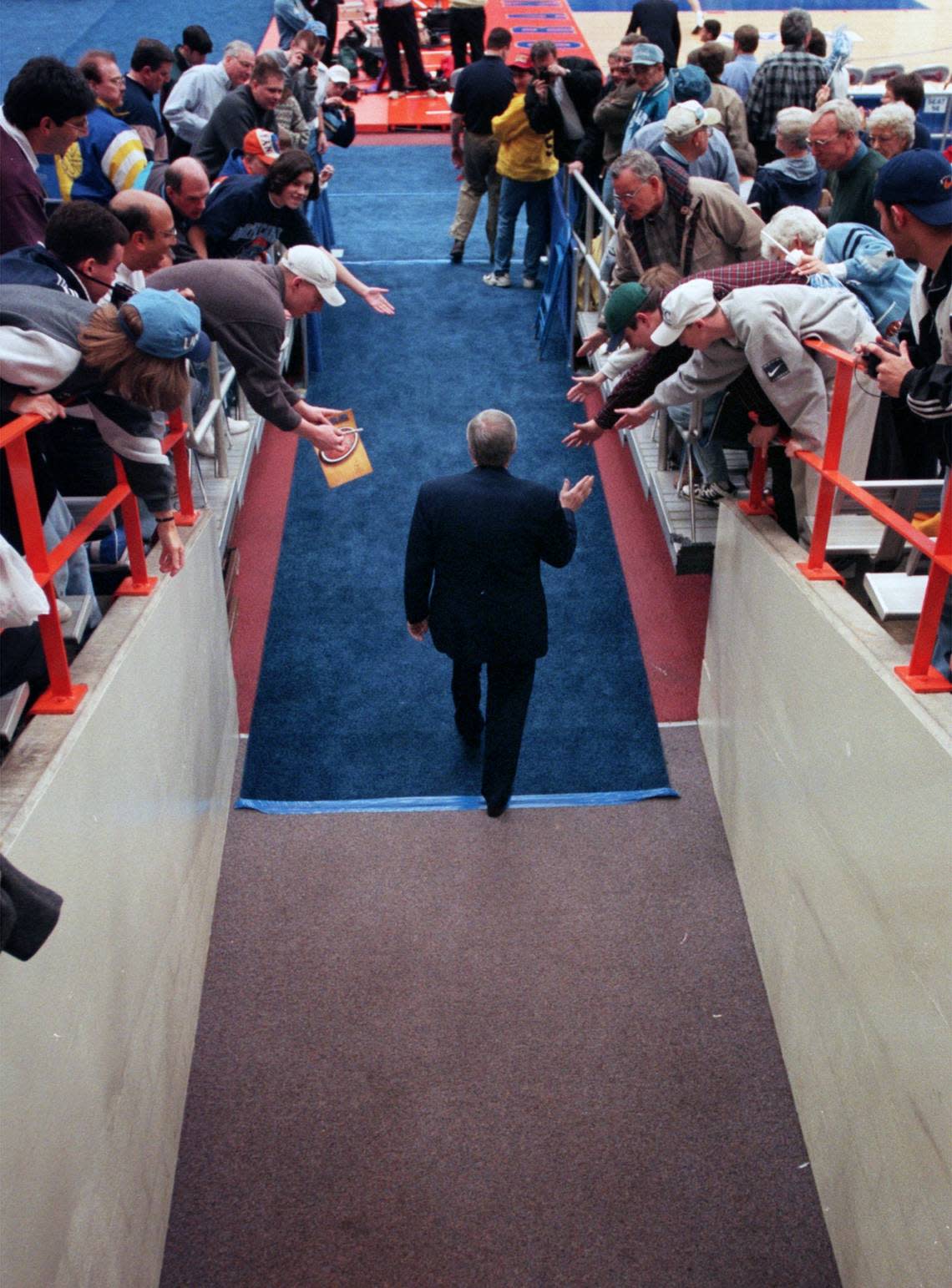
‘I had to lie to my dad’
Smith didn’t want to have a press conference. Had it been up to him, the university would have issued a release and his exit would have been as anonymous as his hiring. Baddour and communications director Steve Kirschner convinced him otherwise by making the same appeal they did as he shunned recognition in March of 1997 before passing Adolph Rupp as the all-time winningest coach.
“He really thought maybe we’d do a press release and he could walk out the door,” Baddour said. “I said, ‘Coach people need to see you. Your players need to see you. They need to know you’re OK. They need to have a sense that this is not illness-related. That this is what you wanted. This will be their opportunity.’ ”
The soft leak of the story began when Rick Brewer and Kirschner in UNC communications began calling national media contacts about a major announcement regarding Carolina basketball. Although they did not confirm or deny what it was regarding, they said enough of what it was not that reporters could make an educated guess.
The major break in news came by happenstance.
Former UNC guard Larry Brown, who was in his first season as head coach of the Philadelphia 76ers, brought his team to Chapel Hill for their training camp as he had done the year prior when he was with the Indiana Pacers. The Sixers roster included former Heels Jerry Stackhouse, Eric Montross and Scott Williams.
As Carolina’s current players trickled out of their locker room, their shock and disbelief couldn’t be disguised. Someone told the former players and longtime NBA reporter David Aldridge, who was with ESPN at the time and in Chapel Hill, the news.
Aldridge told The News & Observer he knew the story was big, but had been out of college sports so long he merely passed on the news to his editors. He said someone involved with college basketball reporting should be the one to verify it.
ESPN’s reporting of the news, along with the soft leaks that sent local media outlets scrambling to send reporters to campus, created a buzz. Some students headed for the Dean E. Smith Center to camp out and wait for the press conference.
Hanners said he received a call from then-Utah coach Rick Majerus, who happened to be in Raleigh filming a commercial for an ESPN promotion. Majerus revered Smith and was as shocked as anyone in the program over the news. He wanted to talk about it over dinner so he took Hanners and Sullivan to Red, Hot & Blue barbecue restaurant.
Shammond Williams recalled being asked by people if the retirement rumors were true as he proceeded back to his dorm room at Granville Towers. Amanda Baker Stoen, who was a co-manager for basketball, was on the phone denying them to her dad.
“ESPN, that was as good as the social media that existed,” she said. “They had gotten wind of it at some point and my dad called me. My dad went to Carolina also and he said, ‘There’s a rumor going around that Coach Smith is retiring, is it true?’ And I said, ‘I don’t know what you’re talking about.’ I had to lie to my dad.”
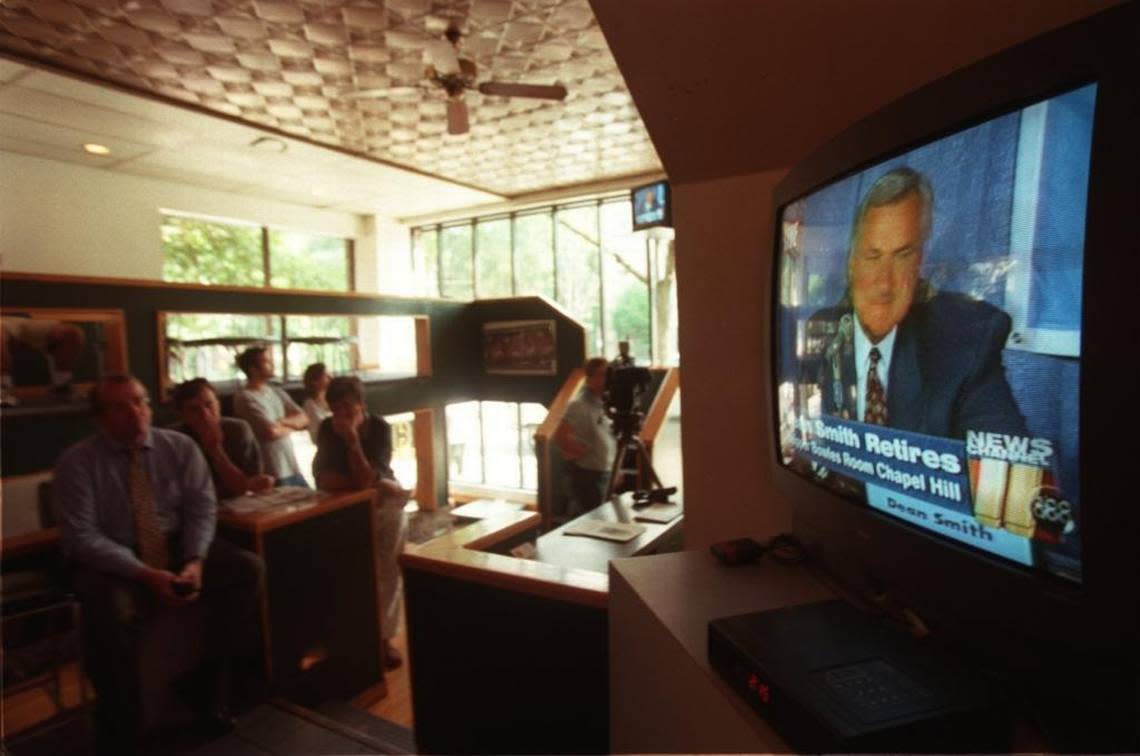
‘A cool moment’
At 2 p.m. on Oct. 9, 1997, Smith would confirm the news to the rest of the world in the old Bowles Hall, a room that is now the Tar Heels’ practice gym located underneath the Koury Natatorium beside the Smith Center.
Sullivan had been dispatched to the airport to pickup legendary Georgetown coach John Thompson. He amazed staffers in the basketball office when he called Smith by his first name because no one at Carolina did. Sullivan had asked Thompson during their drive why he felt compelled to make the trip.
“He just said, ‘I just want to see my friend,’ and that was powerful to me,” Sullivan said. “It was kind of a cool moment to see like another head coach, another giant of the game come down and support him.”
Smith sat at a table with then-university chancellor Michael Hooker, Baddour, Guthridge, Brewer and Kirschner on one side of the room with one microphone he slid back and forth with Baddour. Students and fans gazed from the windows on ground level looking down on the event.
“I have decided to resign as head basketball coach at North Carolina,” Smith began.
“Some events that take place in your lifetime just stand alone,” Jamison said. “I remember exactly how I was feeling, what I was doing. That was definitely one of the moments in my lifetime.”
